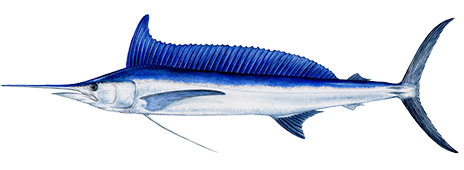
Longbill Spearfish
Data indicates that the longbill spearfish matures by the age of two and rarely lives past three years of age.

Region
South
Catch ease
Hard
Habitat
Ocean
How to identify a Longbill Spearfish
It can be distinguished from other billfishes by its slender, lightweight body, short bill, and its dorsal fin which is highest anteriorly (higher than in marlins and lower than in the sailfish). The ventral fins are located well in front of the anal fin and in all other billfish they are located close to the anal fin. The bill of the longbill spearfish is about twice as long as its lower jaw, but still quite short by billfish standards, whereas the shortbill spearfish has a bill that is barely longer than its lower jaw. The pectoral fins of the shortbill spearfish barely reach to the curve of the lateral line; in the longbill spearfish, they extend beyond the curve. The longbill spearfish has more segments (45 to 53) in the first dorsal fin than any other Atlantic billfish, although it may appear similar to the white marlin. The dorsal fin is bright blue and has no spots. The vertical bars on the body are never as prominent as in other billfish and may show only slightly or not at all.
Where to catch Longbill Spearfish
The longbill spearfish is known to occur in the northwest Atlantic from New Jersey to Venezuela, including the Gulf of Mexico. The following list includes additional details on where to catch this fish:
How to catch Longbill Spearfish
They are pelagic, offshore, deep-water fish that appear to be available all year in small numbers but are infrequently encountered by anglers in most parts of their range. They feed at or near the surface, mainly on small and medium-sized fishes and squids, including dolphin, bonitos, flying fish, needlefish and pilot fish. They appear to be available all year in small numbers. Fishing methods are the same as for other billfish, but with lighter tackle. Most are taken incidentally. The following are fishing methods used to catch this fish:
Longbill Spearfish lures, tackle & bait
The following are lures, tackle or bait that can be used to catch this fish:
